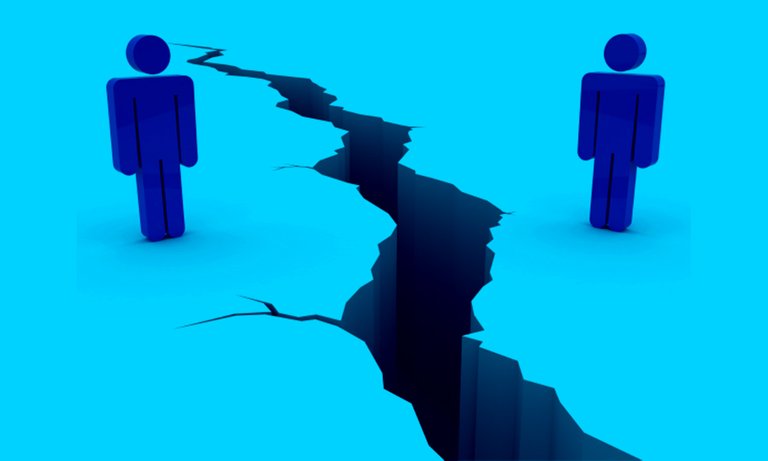
Is it useful to have only the need to type a few letters into a search bar before an algorithm informs us of what we're looking for?
Is it helpful to have a piece of computer code decide what we are interested in, so that we needn't look beyond our facebook home feeds to find news and information?
Many have argued the advantages of such predictive algorithms. Convenience, ease-of-access and time saving are the typical phrases we hear on the lips of those in support of them.
Whilst they can be seen as beneficial through the limited scope of these factors, we must also consider the negative implications that accompany those useful elements.
Tunnel Vision
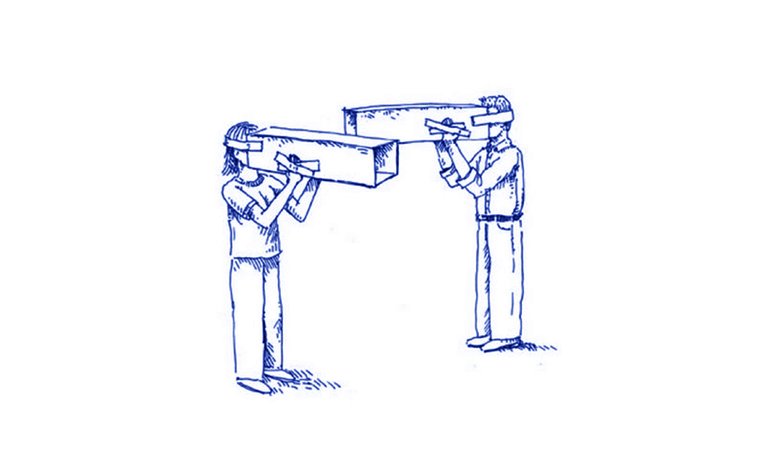
Reality is a completely different experience for each and every one of us. Born into a home with over seven billion people, our sense of individuality is defined by the way in which we perceive the world and everything in it. Uniqueness is certainly not a bad thing, but when that uniqueness comes at the cost of our understanding of our environment, then we lose sight of the fact that it is being unique that makes us all the same.
We are united in our individuality. Our difference to one another is the only thing that each and every one of us on this Earth have in common. This understanding should really be the force that gravitates us towards one another, but unfortunately, far too many of us see our dissimilarities as a reason to push each other away.
Our understanding of the world is limited to the number of perspectives from which we can view it. To see the world through another's eyes, is to discover a part of the world that was previously unknown to us-- thus, enriching our own perspective and bettering the grasp we have on our surroundings.
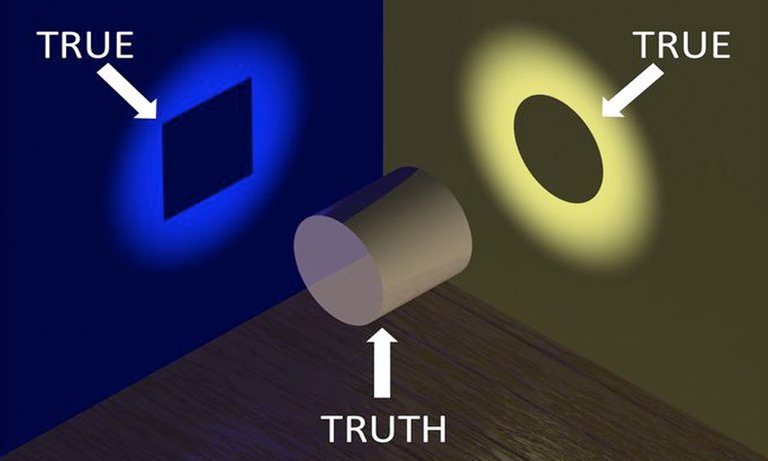
This image is often used to demonstrate how two people discussing any given topic, can both be correct in their assertions. However, I have found that the truly profound lesson to be learned from this image, is far too often overlooked.
The world is a very complex place, with far more than two truths. So consider if you will, that there were a million different perspectives from which we could view this shape to perceive a different result. Only through our movement from one vantage point to another, could we start to develop a better understanding of the true shape, in all its complexity.
In applying this philosophy to our understanding of the world, we realise that truly immersing ourselves in the perspective of another person equates to viewing the depicted shape from another angle, and improving our own knowledge and understanding of what's in front of us.
Social media's predictive algorithms have stolen  — this purpose from many of us, by locking us in a place where we are able to see but one singular view of reality.
— this purpose from many of us, by locking us in a place where we are able to see but one singular view of reality.
The Trap

Much like the unsuspecting mouse, lured into a trap by the seductive scent of freshly cut cheese, we unwittingly allow ourselves to be enticed into a prison of narrow-minded thinking. The source of our seduction is far more difficult to resist, however, for there is more than one piece of bait tempting us towards that cell.
There is the prospect of having to do less— which, amidst a life of slaving away to make ends meet, is a very appealing thing. Who wants to come home after a hard day at work and then exert even more time and energy into sifting through the internet in search of something valuable to read or watch? No one. Not when we can simply put our feet up and click away at items on our facebook home feed, or the recommended and related videos on YouTube.
Reassurance is yet another temptation provided by such algorithms. No one takes pleasure in doubting themselves, as cognitive dissonance can be a very unsettling feeling. Why should we bother to invite criticism of our beliefs? It's much easier to have an endless string of suggested news and information solidify those beliefs for us.

Lastly— and perhaps the most tantalizing of invitations offered by predictive algorithms, is the sweet allure of comfort. By allowing a social media platform to present us with solely the types of information we adhere to, we also—for the most part—remove ourselves from the possibility of interacting with those who have differing opinions.
We can all find comfort in the avoidance of debate. It is hard work burning those extra calories in an effort to discern another's opposing point-of-view. But through our social circles, suggested videos and recommended news feeds, we are able to find only those that were led there by possessing a similar perspective to our own. This minimizes the necessity to indulge ourselves in critical debate and challenge our current paradigm.
Side-Effects

The price we pay for the comfort provided by predictive algorithms is often oblivious to us until an unexpected moment. We believe everything is fine, until a single dose of reality shatters our narrow-minded perspective and leaves us with a crippling inability to make sense of the world we reside in.
Leading up to the election, there were millions of people, in the US and elsewhere, that could have told you without a doubt that Donald Trump was going to win. There were even thousands of videos and articles in circulation that predicted this same outcome with evidence to support the claims.
However, the news of his victory shocked a great number of Hillary fans to their core, provoking them to tears and far worse. Many of the Hillary supporters even took to the streets in outrage, protesting a democratically elected president— essentially calling for a dictatorship instead.
Their actions were mostly the result of severe shock. It was impossible for them to comprehend how Trump could have won— or more accurately, how Clinton could have lost. Social media algorithms had determined that they were Hillary Clinton supporters, and as such, their home feeds and suggested links, articles and videos had presented them only with positive information about her, and negative information about Trump.
They had fallen victim to the trap, believing that the information made available to them was everything they needed to know. Through reading comments on the pro-Clinton posts and videos they were directed towards, they viewed an overwhelming amount of support for their candidate which instilled within them the belief that they were part of the majority.
On the opposite side, those who had been branded as Trump supporters by social media's mathematical predictions, would have only the brighter side of Trump and the many crimes of Clinton presented to them. On the videos that they watched and the posts that they read, no Clinton supporters could be found. Many were surprised to find that Clinton had any supporters at all.
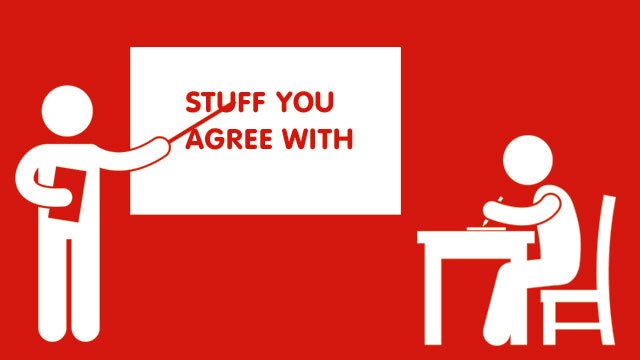
These algorithms which determine our interests, have in effect become little more than self-perpetuating systems of confirmation bias. We are shown what we like and what we agree with. We are shown what our close friends like and agree with. We are shown other people who like and agree with those same things. Everything else doesn't exist, or at least doesn't matter. That is of course, until the day we realise that it does matter, only we were not ready for it.
The Divide
Every day that we avoid conversation with those who have conflicting opinions to our own, we place the next proverbial block in the barricade to communication we are constructing. Before long, that wall is so high that it has become far too difficult for us to converse with anyone holding a dichotomous perspective to our own without getting incredibly angry.
We are becoming too familiar with surrounding ourselves with people who are like us. Consequently, our belief structures are decreasing in fluidity. Where as once we would be happy to update our beliefs to something more accurate upon the reception of new information, now, prolonged detention within social bubbles have solidified those beliefs to a point where it is too unsettling a feeling to have them altered.
We cling to our current paradigms so tightly that to be exposed to an unfamiliar conversation, that has the potential to shake the foundations of our belief structure, provokes a feeling of discomfort which forces us to lash out in defense. This is why it has become so difficult for us to talk to those with conflicting view-points.
Herein lies the greatest problem that we are faced with. The difficulty we now have in communicating with one another is driving us deeper into the social bubbles that made it difficult in the first place. If we do not commit to building bridges to one another, and desist with building barriers, in the coming decades, as we create more labels to define ourselves by and those social circles get smaller and smaller, we will wake up one day and find ourselves truly alone in a world of billions.
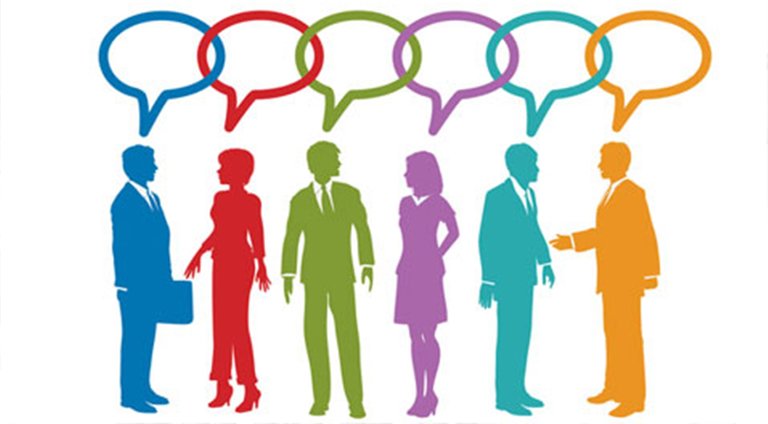
We must force ourselves to converse with others, especially those we are in disagreement with. Whilst it can be unpleasant at first, with each debate we enter into with an open mind, our grasp on our take of reality loosens, and the flexibility is restored to our belief system. I believe this is healthiest state of mind that one can possess. Only through this state of being can we begin to view the world through the eyes of other's, and in turn be rewarded with a better understanding of the world. Along this journey, we may also find that a wider perspective adds a colour and vibrancy to the world that was previously unseen to us.

These are some great points, and well put. When I signed up at Facebook I claimed to be in my eighties and no wife showing up in my stuff, so now I get ads for gay cruises and things that I don't even understand in my feed there. I like to keep 'em guessing.
Lol. That's awesome. I have been getting some very suspicious email ads recently, about piano lessons, weight loss, and dog training. I find it weird because there is often a piano being played here, two mischievous puppies, and I recently did a fast so was talking about how much weight I had loss(though not in a way that suggested I was happy about it).
My only guess is that these ads are coming in response to a microphone that is active in the house. As I don't have one plugged into my computer, it must be my phone listening. I'm now tempted, thanks to your comment, so see if I can influence the next advert to come my way. Then I will know for sure whether some cunts are listening and providing me with ads.
Thanks for the message, and if you hadn't looked yet. Check your wallet. The oracool sent you a little gift. He will be back online tonight probably to do a follow up post on the last one.
I did see that, and I wondered what I had won, or what I was going to win in the future to deserve that! I'll be on the lookout for that follow-up, and I'm sure that the oracool knows that I appreciate the gift.
I'm sure he does too. The annoying little shit knows everything apparently. Lol
I agree with your philosophy of life and doing things, actually the conversation is what makes us aware of many things that we were clueless about. Indeed, the debate is a way of opening a discussion and exchanging ideas by which we could develop our way of viewing things and make a new opinion about things in life ! Thanks for this post it gives a good idea about truth and what is dissimulated I liked it !!
Thanks a lot. I can't disagree with anything you say, and I'm very glad you enjoyed the post.
I've always avoided conflict.
Not only conflict of views, but even physical conflict. While my friends would jump into a brawl to save someone, I would quietly find a way to escape.
I would be happy in my own world.
My journey to ummmm... 'enlightenment?'.. started when I first started conversating with myself.
I realised I was afraid of having a chat with myself, analysing my emotions and the consequences of it.
So in the rare cases I did have an argument with someone, instead of going through it and understanding what went wrong where and why, I would (wow, those were too many 'w' words!) go home and do something completely mindless (like watch TV) to forget about the incident.
But after going through 3 years of depression, I was forced to analyze my emotions and have a conversation with myself.
It was really tough and challenging.
But like someone said:
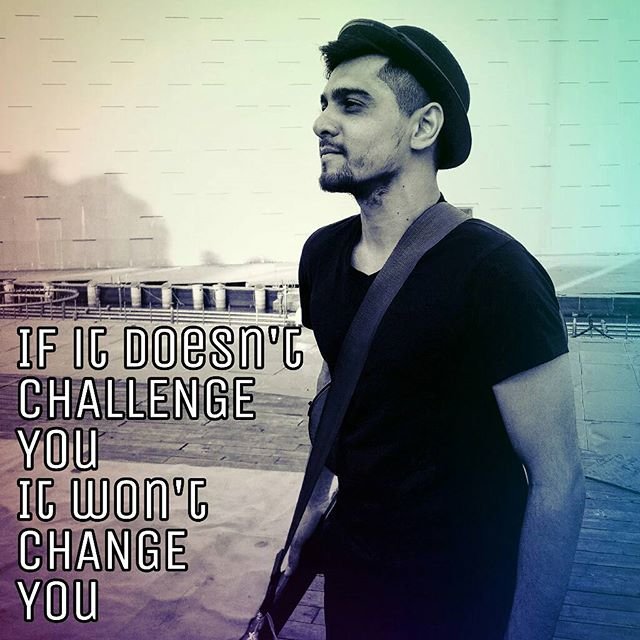
That's me btw. 😄
Once I learnt to understand myself better, why I did certain things I did, I started seeing those patterns in others which allowed me to empathise with them.
So now when I have an argument with someone, I visualise myself in their position, see from their perspective and then come to a conclusion.
This has made me a more tolerant, patient and humble person.
I don't know if I made sense at all. But the article stirred something in me!
Thank you for reading. 🙏🏼
This is a great mindset to hold, I believe. I too find myself analysing each choice I make and each emotion I feel. It is the only way to truly know yourself, what your motivations are, and whether they are coming from the right place.
Thanks for sharing your story, and I hope you are able to retain this philosophy for the rest of your life. For me, it's the only one that can provide you genuine growth.
Agreed! It's a constant battle, each and every day. Sometimes your demons win, but tomorrow is another day and the fight rages on! All you can do is try to be on top every single day.
Yes, that's how I see it. I just try to be better today then I was yesterday, as often as I can.
I'll have to read this tonight.
Great post my friend!
Upvoted.
I can't decide whether you're a spammer or not. Lol.
''The world is a very complex place, with far more than two truths'' What a meaningful words.Great and deeply meaningful post,thank you for.
Thanks for taking the time to read it!
The issue of singular, overriding perspective has been with humanity, since the first man told a story. The technological marvels of the modern era only accelerates the process, but throughout human history, each cultural groups have placed themselves in the center of the universe. What are the multitude of religious systems that preoccupy the human race, if not a narrow, peculiar perspective on the universe?
It is with deep irony that your post resonates with such perspicacity; in an era of infinitely deep and accessible information pool, we humans only bring a cup to fill our own preconceived notion of our world. The Hellenes, Persians, Romans, Chinese, Aztecs, Incas, and Indians of the past can be excused for harboring a parochial, regional perspective concerning the universe, but in this era of information exchange at light-speed, parochialism is a paradoxical phenomenon.
The modern mind seems to be susceptible to two reactions, when confronted with ideology foreign to its sensibility: vehement rejection or unconditioned acceptance both arising from egocentric viewpoint of the universe. Those of the former denies any attempt at empathic understanding of the foreign, since their perspective is the only correct truth; while those of the latter impute a shared ideologic assumptions on the foreign concept, since their perspective is universal in all mankind. It is difficult to judge which of the two is more arrogant.
This is probably the most interesting comment I have read in a while, and very eloquently put, but I fear that I am not nearly as smart as I thought I was, and that this must be going right over my head, because it doesn't seem to make much sense to me.
Could you elaborate on why is it ironic that this post is insightful?
Also, in regards to the narrow-minded perspective of ancient civilizations, I would offer an alternative; that we simply have a parochial understanding of their understandings. History is far too open to interpretation, and to manipulation. I don't think there is a person living today who could speak with any authority on the limited perspectives--or otherwise-- of those who lived thousands of years ago. My guess, from looking at what they managed to build, and how these similar structures can be found in many diverse parts of the ancient world, is that there was nothing regional at all about their outlook on life, and that they were more of a community of Earthlings than we are today, even with us now having the means of communicating all around the world in a second.
I do see exactly what you're getting at here, and it was really the motivation for me writing this piece. However, I do think there are plenty out these who do not default to one of these two options when hearing something that others would consider to be uncomfortable. There is just far too few of those types in the world.
I thank you for sharing such a deeply thought out comment, and I hope you will explain in a little more detail why you consider the post to be ironic.
Thank you for your reply. I find irony in the medium upon which your thoughts arrived, via an internet platform that prioritizes posts according to user preferences (feed).
Thanks for providing me with some clarity, that makes perfect sense now.
The two sides of the coin - acceptance and rejection - are, I think, not related to any ego whatsoever. They are both aspects of the brain's "optimised efficiency algorithm". So many functions are hidden away from consciousness as background processes so they can happen faster. I think the big joke is that so many processes that do impinge on consciousness actually come from the same source. It is so much more efficient to believe what you believe, and reject what you don't believe, rather than consuming all that energy thinking!
Until, of course, something happens to shatter that belief system - and notice that they tend to shatter rather than melt away, like a fission reaction.
I see some alignment with the works of Alan Watts here. One of his most well known books is "The Wisdom of Insecurity". Therein, Watts makes a very interesting distinction between belief and faith. The relevant passage can be found here:
We must here make a clear distinction between belief and faith, because, in general practice, belief has come to mean a state of mind which is almost the opposite of faith. Belief, as I use the word here, is the insistence that the truth is what one would “lief” or wish it to be. The believer will open his mind to the truth on the condition that it fits in with his preconceived ideas and wishes. Faith, on the other hand, is an unreserved opening of the mind to the truth, whatever it may turn out to be. Faith has no preconceptions; it is a plunge into the unknown. Belief clings, but faith lets go. In this sense of the word, faith is the essential virtue of science, and likewise of any religion that is not self-deception. (For the online version, see https://www.brainpickings.org/2014/06/27/alan-watts-belief-vs-faith/)
Whenever I see, hear or read anything, I have that voice in my head. A voice that says to me that faith is a reservation of judgment, a willingness to be ready for new information. While it is true that there are facts that can be verified by peer review, within and without scientific circles, I have found that certain beliefs that I once long held cost me dearly in terms of setting expectations.
As a middle aged man, I have learned to reserve judgment, to keep my expectations low, or to have none at all. I have learned the sorrow of unreasonable expectations well.
I have even come to a point where I can easily admit that "I don't know", because I have seen situations in my life where that is the safest thing I can say a that moment. "I don't know" allows for uncertainty, it strips all expectations away and leaves the beholder curious and ready for new information.
I have listened to a few of Alan Watts' talks on YouTube. He is a fascinating man. So articulate, and incredibly funny to boot. While I do think he also talked a lot shit at times, a lot of what he said truly gets your mind into exercise mode.
I would have loved to have seen him live at some point actually. A shame the dude is gone now.
As for my thoughts being aligned with his.. I don't recall ever hearing him talking about this subject, but, I have fallen asleep listening to him before, so perhaps something related to this subject was playing while I slept, thus, making me believe I came to this conclusion based on my own observation. But perhaps, they're really just his.
If I'm honest, not judging people is the most difficult thing for me. I mean, is judgement really so bad? Prejudice certainly is, but should we not judge people based on their actions, and then make a decision about whether we want to be near them?
I would love to be more tolerant of idiocy, and I try to be every day. And considering I was an idiot myself for such a long time, it is awfully hypocritical of me to have such a low tolerance for it in others... But, I just see so few people making any effort to change their ways, and it can be quite disheartening.
I have a lot of respect for you, for the patience and tolerance it seems like you possess. If you have any Alan Watts talks on how I can help myself with that, it would be much appreciated. Lol.
Thanks a lot for the insightful comment!
I actually have a book you can use. It's for parents raising kids, but seriously, how many of us have actually grown up? It's called "Raising Human Beings" by Ross W. Greene (I talk about it in a few of my blog posts here) and offers a basic premise as the subject of departure: "Kids would do better, if they could."
When I see people behaving "like an idiot", I set aside my desire to judge them for a moment, and consider the possibility that they lacked the capacity to do better. I use the words of Dr. Greene and suggest that when people behave badly (not a judgment, just lack of a better description) and say to myself, that the person I'm observing lacked the capacity to respond adaptively to the demands of her environment.
Once I started framing everything I see in the context of a lack of skills to respond adaptively to the environment, I began to see people in a whole new light. No longer do I take anything personally anymore. No longer do I feel the need to punish another for not getting it (whatever it was I wanted them to understand). With that came nearly infinite patience for people who simply lacked skills. Why?
Because now motivation is not a factor. I don't worry if people wanted to bug me. When people are upset or angry with me, I let them be and talk to them until they calm down. Talking to someone tends to engage logic. And I mean talking in a calm tone, acknowledging them, without reprisal.
I've been practicing this for years and it takes a lot of practice to hone it to a fine art. Anyway, I recommend that book to anyone, even if they don't have kids. For me, it gave me something I didn't expect to get: self compassion.
This comment made me laugh. Simply because, it is pretty much the opposite of my perspective on it, which is a little ironic. You think it is perhaps mean of me to be intolerant towards idiocy, which I would agree with, but I do hold the belief that we all have the capacity to be better. It seems worse than intolerance to simply write them off as essentially lesser people.
Sounds like an interesting book nonetheless. I'm always looking to improve myself. Though... I'd rather an audiobook. I don't have much patience for reading. Seems an inefficient use of time to me.
I'm glad you had a laugh. I was really speaking from my own perspective, but using the same term to maintain the frame of reference.
Anyway, you inspired me to write a blog post. Thank you for your inspiration.
Love it when that happens. Consider yourself invited to provide with me the link afterwards. No flag--
Your invitation is appreciated:
https://steemit.com/life/@digitalfirehose/judgment-idiots-and-self-compassion
Thanks.
Reading on Steemit...
I see much depth in this post.
I will resteem this...
Thanks for the support, buddy.
Of course friend; great piece!
You have strong points in the post, every entity on this planet has its own existence and right to express his opinions. Why people try to impose their beliefs on them and wanna change their mind sets according to them.
I came to your blog because @denmarkguy said you do some good graphic footers. I don't use footers but I figured I'd take the advice of someone who's work I appreciate and look at your work.
The first thing I found was your "We Need to Talk" post.
I watched the video, I read the post, I read the comments.
I still don't know who is right or wrong in all of this but it is a STUPID FUCKING CONTEST and it has obviously become a huge distraction for a lot of people.
I would ask that you have a rational public discussion with whoever you think is ultimately responsible for wrongs committed.
Not a group, one person.
Right here, on Steemit.
Let the community observe how people work to settle their disagreements here without it turning into some mutually destructive flag war.
If your beef is with @timsaid then the two of you can hash it out while the rest of us get on with our lives.
Keep it objective and professional, if the two of you can't work it out, then the rest of us can at least make our own judgment as to who the asshole is.
I would recommend a post tile of "@son-of-satire & @(whoever) Discuss the Future or Demise of Steemit".
I think the idea is a great one, and I would be most willing to do so. The thing is, this conversation you speak of already happened in full view of everyone on the competition post. Once that conversation was over, the comments aimed at me where edited to make what I was saying look out of context.
I do not think someone who believes their actions to be appropriate would have to go to such lengths, nor would they edit the post where they offered to buy votes to no longer contain that offer.
Nonetheless, if either @timsaid or @eltooni would like to air this out in public, respectfully, I would be fine with that.
I didn't see the competition post.
And I simply don't have enough data to come to any type of conclusion.
I just think it best to avoid the kind of proxy flag wars that I know have occurred in the past.
Maybe a disinterested 3rd party can start some kind of dialog?
I am involved in no flag war. I have been flagging spam and double votes on the competition. It was in retaliation to this that I received a great number of flags, but I have not responded in kind. I consider it a waste of my limited power to flag out of spite.
I thank you for your attempts to help find a resolution, but the competition is just now coming to a close I believe, so I don't see much of a chance of them wanting to talk about the ethics of their decisions once it has finished.
I read your post about flagging spammers and wasn't implying you were engaged in a flag war.
I just know how quickly things can deteriorate and how much the entire community suffers when something like that happens.
It may very well come to naught, but I think it's worth the effort.
So far, you've been the only one to respond, but I can hope.
Well I commend you for trying. If you do have any luck, you know where to find me. I will do what I can to dispel any friction this may have caused among the community, because that was not my intent. But, I couldn't watch this shit happen and remain silent.
I totally understand.
Not knowing you more than reading a few of your posts, I think you do have the community's best interest at heart. If I didn't think that, I wouldn't have said anything.
Great post. I definitely agree with your opinions. It seems as this would be one of few cases made that could argue that technology is detrimental to our society and human psychology. If we don't change our way of communicating we will soon adapt and evolve into some strange, technology loving, depressed, introverted creatures who will seek to express their reality through technology and not physical contact/face-to-face conversations. This is 180degrees different from what has been our brain's mode of operation for millenia.
Yes, the growing insecurity in society is another thing worth mentioning, In fact, that ought to be a post in its own...
You want to write it?
Haha @son-of-satire I have no doubt that we're on the same page. Great article, thnx for suggesting it. Keep posting stuff like this atleast you are creating exposure and thats more than anyone can say.
Upvote and follow me
I'll follow your account to see how you doing :). Please follow me @yash0108